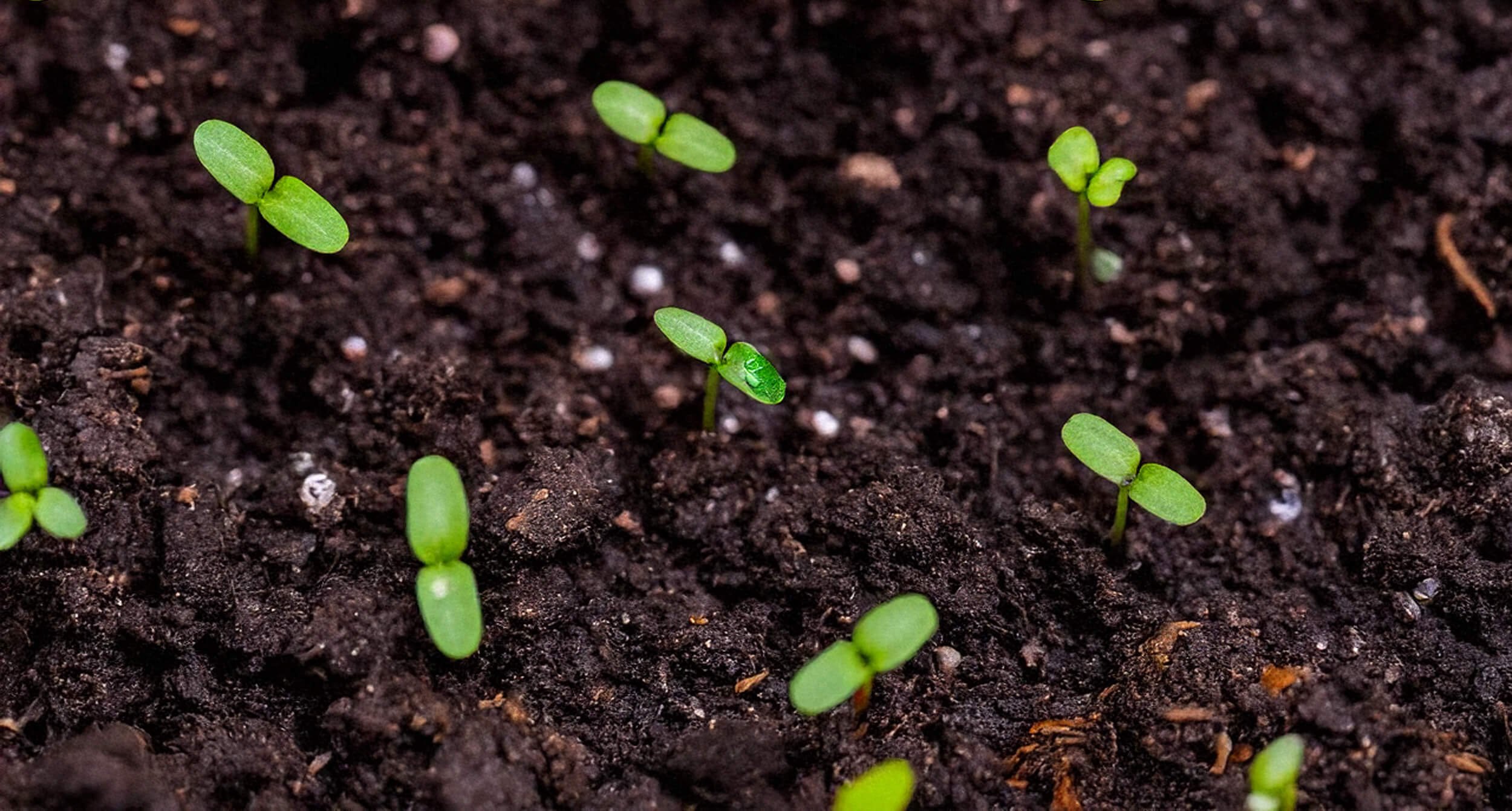
Crop Aid Seed & Crop Aid Seed Plus
Activate Bacteria & Fungi, Enhance Germination & Vigour
Crop Aid Seed and Crop Aid Seed Plus are liquid solutions formulated to activate bacteria and fungi around the seed and enhance germination and vigour. They are also formulated to supplement and maximize a standard fertilizer program. Crop Aid Seed Plus has four strains of mycorrhizal fungi added into it.
PRODUCT SAFETY DATA SHEETS (2025):
Day 4 - Canola
NOT Treated
Day 4 - Canola
Treated
Frequently Asked Questions:
-
Crop Aid Seed and Crop Aid Seed Plus liquid solution is applied directly onto seeds. Both are safe to mix with most inoculants, fungicides and insecticides. The rate of application is 100 ml/bu (3.4 US oz/bu). Water may be added if necessary to achieve optimal seed coverage and maximize plant health.
-
Crop Aid Seed and Crop Aid Seed Plus can be applied to the seed up to 120 days prior to seeding.
-
Crop Aid Seed and Crop Aid Seed Plus contain a unique blend of Lignin extract and kelp extract. It also contains other macro and micronutrients including:
Nitrogen
Phosphorous
Potassium
Manganese - EDTA
Iron - EDTA
Boron
Zinc - EDTA
Crop Aid Seed Plus ALSO includes 4 strains of Mycorrhizal Fungi
-
Crop Aid Seed & Seed Plus comes in the following container sizes:
10L jugs (2.6 US gal)
500L tote (132 US gal)
1000L tote (264 US gal)
Day 4 Peas
NOT treated
Day 4 - Peas
Treated
Don’t just take our word for it:

Benefits of Mycorrhizal Fungi
Mycorrhizal Fungi In Your Soil:
Extends the root system by creating hyphae
Is responsible for over 50% of the phosphorus uptake in plants
Helps to absorb more water which increases plant water uptake
Improves soil structure and contributes to soil aggregation
Helps plants resist and overcome pathogen infections
Contributes to higher yields and healthier crops
What is the Rhizosphere?
The rhizosphere is an envelope of soil surrounding the individual rootlets. It’s also where the tiny bacteria and fungi live and form symbiotic relationships with the seedlings. In the rhizosphere, the kelp solution keeps the plant well-fed, while also stimulating the life in the immediate vicinity. This ensures that the additional nutrients are better absorbed and stored in a readily available form that the plant can access.
Pea plant treated with Crop Aid Seed
Barley plant treated with Crop Aid Seed
What is the lignin and why is it beneficial to the soil?
High source of carbon and nitrogen.
Encourages the activation and growth of beneficial microorganisms in the soil.
Acts as a fertilizer catalyst reducing the loss and soil tie up of soil-applied fertilizers.
Increases fertility of soil.
Helps to loosen and aerate the soil and improves moisture holding capacity of the soil.
Aids in building up the plants defences against disease and pests.
Helps to reduce the population of soil born pathogens.
Strong chelate ability allowing the minerals to be absorbed by plant roots.
Increases plant growth by stimulating life in the rhizosphere.
Increases plant health.
Increase yield & seed quality.

The Benefits of Kelp In Your Soil
Why we use kelp and seaweed
For centuries, farmers have known the value of kelp. Kelp is able to extract many inorganic substances available in the ocean and convert these inorganic compounds into organic compounds, making kelp solution an outstanding source of these compounds.
To produce a good crop, you must prepare the soil to nurture the millions of tiny feeding roots.
Kelp solution both feeds plants and enriches the soil rhizophere with a wide variety of nutrients, conditioners and growth stimulants. The elements that kelp extracts provide are known to promote strong plants and healthy growth. They also naturally increase plants’ resistance and tolerance to all kinds of stressful conditions.
Improve Crop Quality with Kelp Solution
Healthier plants and improved crop quality can be achieved through the use of kelp solution. These claims have been proven to be true by commercial kelp product users. Research has shown the following benefits when kelp products are used:
Faster seed germination.
Increased growth of new plants started from cuttings and seeds.
Healthier, more uniform, and stronger plant growth.
Increased stress tolerance.
A better quality harvest and safer storage with less waste.
The increased bio-availability of other nutrients usually trapped in the soil.
Kelp extracts act as biostimulants of plant growth and development. We include kelp extracts in our Crop Aid Plus™, Crop Aid Seed and Crop Aid Seed Plus.
Canola Plant in Field Treated with Crop Aid Plus
Why is Kelp Beneficial?
Promotes growth of beneficial soil microbes and boosts microbial activity.
Increases nutrient uptake by roots.
Improves soil structure and aeration of soil.
Acts as a biostimulant and enhances seed germination and vigour.
Acts as a chelator and improves utilization of minerals.
Increases nutrient availability to crops.
Increases plants resistance to stressful conditions including disease, insects and other stressors.
Increases plant growth, increases yield, increases flower set, increases seed production, improves propagation of seedlings and cuttings, and increases crop quality.
Check Out THIS Demonstration of Crop Aid Products over Two Consecutive Growing Seasons:










